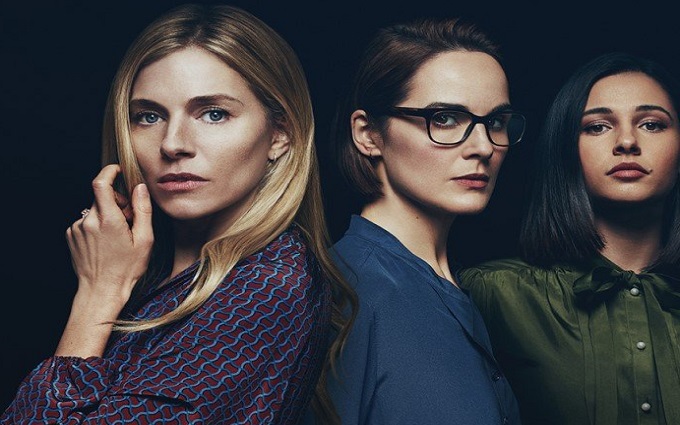Anatomy Of A Scandal Review

The Plot
After public revelations of an affair, a prominent politician and his wife are swiftly plunged into even greater drama when more damning allegations find him on trial in court accused of rape.
The Good
Framing this drama around a court case instantly gives this series a convenient narrative structure and offers the absolute certainty of a definitive outcome. The inescapable desire to uncover that result is easily enough to make viewers enthusiastically binge through six episodes of fraught courtroom drama.
Homeland star Rupert Friend does a magnificent job of bending his performance to portray the many different versions of his character that the story presents. At times he’s a mostly well intentioned man fighting to salvage his marriage and career from the hyperbolic fallout of his selfish indiscretions, while at others he’s a shamelessly predatory political monster oozing arrogance. Repeatedly exploring scenes from different perspectives, he adeptly convinces as both, keeping audiences guessing for much of the series about his ‘true nature’.
Alongside Friend’s central antagonist a trio of star turns from Sienna Miller, Michelle Dockery and Naomi Scott breathe compelling life into the traumatized wife, determined lawyer and lover turned accuser each respectively fighting to expose that truth. Their earnest and effective performances allows the series to sustain much of its suspense and drama.
Notable supporting turns from Josette Simon and Joshua McGuire also helps the series deliver credible legal and political tension. Josette Simon’s defence barrister is a perfect counter to Michelle Dockery’s ‘righteous anger’ in court, while Joshua McGuire’s unapologetically odious spin doctor is a fractious thorn in the side of Sienna Miller’s efforts to cling onto a rose tinted view of her once devoted and inspiring husband.
Arguably the series greatest success is that it consciously avoids allowing audiences to second guess the outcomes of the trial or each characters individual journeys for as long as possible. By jumping back and forth between events of the past and present day as experienced form different characters perspectives, the series presents a far more ambiguous and interesting dilemma. To at least some extent it manages to force audiences to avoid becoming too complacent in their initial expectations and pre-existing prejudices.
That knowingly jumbled uncertainty compels audiences to watch all the way to the final scenes and even then will likely leave them with some provocative lingering questions about the true nature of privilege, power and the unreliable perspective we have on our own actions.
The Bad
Five years of relentless public debate and numerous self-reflective tv/film dramas addressing the MeToo movement sadly robs this series of much of its potential impact and originality. In particular critically acclaimed series like Liar and National Treasure have already expertly explored the complex and compelling themes of he said/she said courtroom battles. Those productions and copious real life drama may leave this specific series feeling somewhat overly familiar and a little more redundant than it probably should.
While Anatomy of a Scandal starts out as a fairly grounded and realistic dissection of real life questions of power, privilege and politics; it ultimately resorts to increasingly implausible twists and turns in order to sustain an ever escalating sense of sensational drama. Arguable injecting that shock value into proceedings sacrifices credibility in favour of a more entertaining but silly melodrama.
While the series also purposefully paints all its characters in murky shades of grey, undoubtedly some audiences may find it consequently more difficult to emotionally invest any of them. The series doesn’t offer audiences the convenient escapism of clearly defined heroes and villains. Instead it perhaps uncomfortably reminds us of a grim reality where everyone seems almost equally flawed, selfish and hypocritical. It’s a deeply cynical portrait that might not be especially welcome or entertaining for many.
It’s also true that while the gifted cast perform well, they’re still tied to a script largely built upon fairly heavy handed stereotypes. Of course many would argue that unapologetically debauched politicians, sneering spin doctors or cynically ruthless lawyers are undeniably part of real life. However there’s a fine line between piercing portrait and clumsy caricature. As the series proceeds its’ well intentioned eagerness to lash out against any form of privilege and power perhaps forces it to cross that line. It increasingly turns characters into clichés, sacrificing subtly to deliver mostly blunt two dimensional commentary.
While the series also tries hard to purposefully defy expectations with an unpredictable plot, it only manages to achieve this by occasionally veering into more wildly unrealistic territory and ultimately remains otherwise exactly as expected.
The Ugly Truth
Anatomy Of A Sandal is a very deliberately timely slice of courtroom drama that explicitly reflects on some of the most prominent political and social problems of today. An excellent cast, polished production and copious plot twists make it an easy binge watch. It’s also a mostly compelling experience, even if it has been undoubtedly robbed of impact by copious real world introspection and similarly themed recent dramas.
The Lost City Review

The Plot
A bereaved romance writer gets reluctantly thrown into an exotic real life adventure alongside her handsome cover model when an eccentric tycoon becomes convinced her latest novel is the key to uncovering real life treasure in the ruins of a mythical lost city on a remote private island.
The Good
The Lost City is unapologetically silly fun of the highest calibre that delivers consistent laughs thanks to a perfectly playful script and a terrific line up of acting talent.
Hollywood icon Sandra Bullock successfully adds yet another memorable romantic adventure to her glittering cinematic cv. This latest romp as an introverted author dragged into an adventure quite literally ripped from the pages of her own book, takes its place proudly alongside Bullock’s most beloved work. She pairs effortlessly well with the films embarrassing riches of leading men, with Daniel Radcliffe, Brad Pitt and most especially Channing Tatum.
Channing Tatum has spent much of his career perfecting his unique brand of legitimately handsome swagger and amiable idiocy. It’s an absolutely ideal fit for this role. There’s endless joy to be found in Tatum’s surprisingly sweet natured male model and his enthusiastically fumbling attempts at real life dashing heroism. Tatum’s brilliant buffoonery makes him quite literally the butt of many of the film’s best jokes. Routinely sacrificing his own dignity to ensure audiences’ get the greatest giggles.
Brad Pitt indisputably remains one of Hollywood’s most compelling leading men, but in The Lost City he is on astonishingly good ‘scene stealing’ form. As the ruggedly heroic Jack Trainer, Pitt injects some authentic action into proceedings and serves as an absolutely perfect comedic counterpoint to Tatum’s hapless but well intentioned model. Pitt’s own uniquely golden aura as a Hollywood superstar gives his character an even more hilariously impressive charisma. Making the absurd contrast between his ruthlessly efficient Special Forces vet and Tatum’s fumbling well-groomed wannabe even more entertaining. In truth, not since Tom Cruise’s infamous appearance in Tropic Thunder has an unexpectedly A-List supporting turn so magnificently improved an already great comedy.
Harry Potter star Daniel Radcliffe clearly also delights in embracing his darker side as he revels in providing the film with a suitably grand pantomime villain. Bearded and immaculately suited his treasure hunting tycoon is an effective blend of well-spoken awkwardness and sneering intensity. Providing just enough genuine menace to propel the plot convincingly. A clumsier comedian would likely have taken the role too far and drowned out other performances by being too suffocatingly flamboyant. But Radcliffe wisely plays the part with enough sincerity to allow him to still play the ‘straight man’ when the film requires.
The end result of this smorgasbord of acting greatness is a film that exceeds expectations as a delightful does of hilarious high adventure. Poking gentle fun at pulp fiction page turners The Lost City captures many of the very best qualities of the eternally popular romance genre. The film is affectionate rather than acerbic and sincere instead of sarcastic, allowing audiences to revel in the good natured glee. Making it a delightful rare treat with truly re-watchable charm.
The Bad
Much like the guilty pleasure romance novels the film playfully mocks, there is a certain level of predictability to its’ plot. The film treads mostly familiar paths towards obviously expected conclusions. However that really shouldn’t diminish the joy most audiences will undeniably have along the way.
It’s also fair to say that this is a romantic comedy that leans heavily upon its’ comedic charms rather than offering any especially steamy romantic chemistry. Even when the film does deploy Tatum’s famously well chiselled physique it’s exclusively played for laughs. Likewise the playful banter between him and Bullock tickles funny bones but rarely comes close to tugging meaningfully on any actual heartstrings. Providing plenty of giggles but little opportunity for those who want to be swept of their feet with swoon.
The Ugly Truth
The Lost City is a riotously funny ride that takes full advantage of an amazing a-list cast on top comedic form. Self-aware, sharply satirical and satisfyingly silly it’s the perfect antidote to the real world woes of 2022. Packed with memorable moments it’s a glorious haul of comedy gold that deserves to be enjoyed on the big screen.
Belfast TIFF Review

The Plot
An Ulster Protestant families’ life in Belfast during the height of the infamous ‘Troubles’ in Northern Ireland in 1969 is retold form the perspective of their nine year old son Buddy.
The Good
Award winning director Kenneth Branagh has described Belfast and his most deeply personal film to date. That earnest and intimate act of uninhibited personal storytelling is laid bare in both a finely worded script and well-crafted direction. The result is a shamelessly crowd pleasing tale that is drenched in affectionate nostalgia and teary eyed poignancy. The deep connection between one boy’s transformative childhood experiences and the tumultuous upheaval in a vibrant and uniquely complex community is a powerful piece of narrative framework that enables the film to speak to a wide and deeply affected audience.
Branagh is assisted in his storytelling ambition by a truly all star cast with Catriona Balfa, Jamie Dornan, Ciaran Hinds, Colin Morgan and Dame Judi Dench all on excellent form in a memorably brilliant ensemble. In a true star making performance the film’s young leading actor Jude Hill also provides the film with the heart and humour of an authentically childlike perspective.
The film might be accused of being overly sentimentalised, but it does feel like a truly authentic tribute to an ultimately uplifting childhood set against the backdrop of an admittedly painful collective history and complex social struggles. The film is alluringly imbued with an affectionate array of earnest energy
The Bad
Those who have their own personal recollections of this period of Irish history or ardent views about the admittedly sensitive and enduringly complex social situation in Northern Ireland, may of course find that their own emotions and opinions aren’t entirely matched with those captured in this film. In particular perhaps more cynical critics will suggest the film presents an overly simplified or saccharine view of a difficult world, filtered explicitly through childish eyes.
Likewise those who find themselves irrationally off put by the mere sight of a prepubescent protagonist may be a tougher audience for Jude Hill’s star making turn as Buddy.
But that shouldn’t really been seen to diminish the films broad appeal and undeniably fine qualities.
The Ugly Truth
As a crowd pleasing piece of well-crafted childhood reminiscences, Belfast serves up a delightful cinematic treat that is almost certain to be richly acknowledged come awards season. The deeply personal project represents an undisputed high point in Kenneth Branagh’s career behind the camera.
The Power Of The Dog TIFF Review

The Plot
A slow burn western drama set in 1925 following the Burbank brothers, a pair of wealthy Montana ranchers. When George Burbank unexpectedly brings home a new wife Rose and her existing son Peter, it triggers a menacing campaign of cruelty and psychological torment from his tyrannical brother Phil. Setting the new ‘family’ on a tense and perilous path toward possible destruction.
The Good
Director Jane Campion brings her much celebrated talents for tense drama and sumptuous visuals firmly to bear on a palpably menacing tale of repressed desire and cruelty. The Power Of The Dog is an openly hostile and terse examination of familiar Western tropes that will captivate considerable compulsive viewing thanks to a barrage of talented performances from an all-star cast. Understated and relentlessly intense it’s an unapologetically challenging piece of fraught psychological drama that rides towards some truly unexpected conclusions.
Benedict Cumberbatch expertly transforms his quintessentially British charms into an authentically menacing presence as a tyrannically hard edged Montana rancher. As the film’s cruel antagonist Cumberbatch absolutely excels in injecting layers of inner turmoil and seething toxicity into the character. The Sherlock and Star Trek star has always been able to adeptly turn his cold eyed stare and hard spoken eloquence into powerful villainous weapons. Yet again he does so to excellent effect in a compelling performance that paints rancher Phil as dangerously harsh and fragile.
Alongside Cumberbatch’s totemic performance the real life pairing of married stars Jesse Plemmons and Kirsten Dunst as the couple caught in the crosshairs of Phil’s cruelty provides the film with a ready-made understated emotional authenticity. Both Dunst and Plemmons are on typically fine form as the victims of toxic torment struggling to navigate a path to happiness in the face a truly menacing obstacle.
Kodi Smitt McPhee likewise is an invaluable asset to the film as Rose’s seemingly mild mannered son Peter. His character instantly becomes the explicit battleground over which Phil launches his sustained assault on Rose and any hopes of coexistence within the newfound Burbank family. Phil’s openly bullying hostility and tense proximity to Peter throughout the film is precisely what creates an ominous sense of danger and ultimately drives the story towards truly unexpected end games.
Kodi Smitt McPhee’s performance is certain to garner awards attention and firmly establishes that his talents extend far beyond playing smaller roles in blockbuster franchises like X-Men. He belongs firmly alongside top billed acting powerhouses with star billing. Although he may possibly find it a little hard to quickly shake off this career defining role as Peter.
The Bad
The Power Of The Dog has the familiar visual landscape of a traditional western, but beneath that superficial similarity of setting it is actually more of an aggressive deconstruction of the eternally popular genre than an actual true ‘Western’. While some people will welcome a sluggishly paced meditation on ‘toxic masculinity’ it obviously won’t satisfy anyone expecting the typical crowd pleasing delights of a conventional ‘western’.
While director Jane Campion might clearly intend to hijack and explicitly confront the alleged ‘myths’ of admirably heroic hyper-mascuiline cowboys that the western genre traditionally exists to celebrate; that obviously won’t be a particularly pleasant or welcome character assignation for some audiences.
Despite the film’s attractive cinematography and arresting score, its unapologetically languid and brutal slow burn drama might still prove somewhat offputting for those that find its’ relentlessly brooding tone to be genuinely uncomfortable viewing. Others may also find some of the films tropes about emotional repression to be a little too heavy handed in places. Leaving the film with less of a deconstructive shock value than it perhaps aspires to deliver.
The Ugly Tuth
Undeniably beautiful on screen thanks to expertly moody cinematography, The Power Of the Dog is a seemingly inevitable awards contender that will attract a large audience due to its abundant star power, though might not satisfy those seeking a more conventional western. Slow paced, bleak, serious and by turns shocking it’s a film that at the very least commands attentio
Last Night In Soho TIFF Review

The Plot
A 60’s obsessed modern day fashion student finds herself seemingly magically transported each night from her bedsit to the lurid and dangerous world of 1960’s London nightlife. Her visions of the mirrored life of wannabe singer Sandie quickly posing strange questions about whether these are purely figments of imagination or a genuine ghostly connection across generations.
The Good
Edgar Wright is a director of distinctive and unique style. His flair for eccentric visuals, compelling camerawork and pop culture infused musical masterclasses have been long celebrated. They’re all tools that make him ideally suited to breathing surreal dream like life into a script from Oscar nominated screenwriter Krysty Wilson-Cairns.
The films unapologetically dizzying descent into flashbacks of a neon drenched nighttime wonderland of London’s swinging sixties heydays is a unique form of frenetic escapism. Those that have habitually enjoyed Wright’s past cinematic treats will welcome his unleashed explosion of imagery and ideas.
Wright’s best loved work has always toyed with an alluring mix of cinematic nostalgia and jukebox musical charm. In a way this latest offering boldly stretches this even closer to being a full blow musical that is lush, eerie and evocative by equal measure. Packed with plenty of familiar cinematic references for enthusiastic film buffs the combined result is a truly original creation driven by deeply personal undertones.
Alongside the film’s lurid visual charms competent performances from stars Thomasin McKenzie and Anya Taylor Joy and menacingly murderous perils of London’s toxic underbelly make the experience even more compelling.
The Bad
While the film’s explosive barrage of ideas, themes and visuals is an initially immersive and rewarding escape, it’s also fair to admit that the film as a whole is somewhat overwhelmed at times by the sheer weight of its combined elements. It’s clearly hard beyond a certain point for the film to sustain it’s early exhilaration and service the competing needs of being a nostalgia drenched surreal musical horror thriller..
Though the film’s purposefully sleazy and dark edged underbelly does inject a sense of peril to proceedings it obviously also prohibits the film from being the kind of whimsically escapist fun that might be more universally appealing. Likewise the swirling mess of ghostly dreams within dreams makes it a little difficult to sustain a coherent conventional plot. Audiences hoping to cling to a simple narrative structure and straightforward message might find this film’s hazy fog of ideas much harder to grasp hold of.
The Ugly Truth
Director Edgar Wright delivers another eccentric musical masterclass with a luridly dream like dive into the delights and darkness of 1960s London nightlife. For fans of his past work and those similarly drawn to this alluring period of the past it will be an especially crowd pleasing if sometimes nightmarish dream.